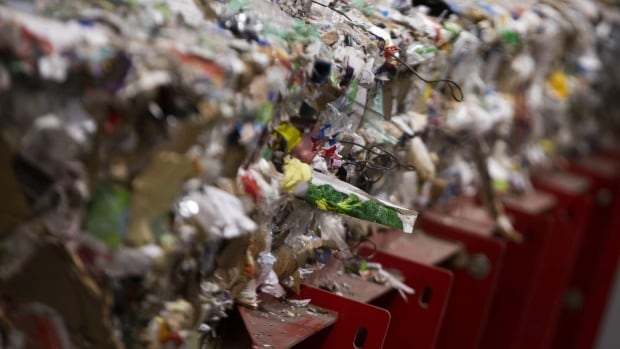Ontario is the latest province to make companies foot the bill for processing the paper, plastic and metal that gets tossed into blue bins on a weekly basis.
The idea behind the change is to make industry accountable for recycling — both in terms of the financial bottom line and the targets for the amount of waste that actually gets kept out of landfills.
The plan will roll out starting July 1 and gradually take hold over the next two years.
Environmental groups have welcomed the approach, known as Extended Producer Responsibility (EPR), since it puts the onus on industry.
“The companies that are selling us the packaged goods will be responsible for managing the waste,” said Karen Wirsig, plastics program manager with the advocacy group Environmental Defence.
But gaps remain — and environmental groups and experts say they reflect broader problems with the approach to recycling taken across much of Canada.
The focus of the program is primarily on households, which produce less than half of all waste in Ontario, Wirsig said.
It also doesn’t include a deposit-and-return system for non-alcoholic beverages, (although Ontario’s Environment Ministry is now exploring the idea), nor does it address what experts say is an increase in difficult-to-recycle packaging.
EPR not a ‘cure all’
All Canadian provinces now have some form of EPR system for packaging. The Ontario plan will expand to many types of plastic, and will standardize what people can put in their blue boxes in every municipality.
In addition to plastic, paper and cans, residents will also ultimately be able to put in single-use products and packaging, like plastic cups, stir sticks, straws and cutlery.
Calvin Lakhan, a post-doctoral researcher and co-investigator of the Waste Wiki project at York University, said EPR is often characterized as a “cure all” for recycling programs, because in theory it saves taxpayers money and allows for the expansion of recycling programs at the expense of industry.
But he said in practice that hasn’t been the case.
“What a lot of people don’t realize is that just because you put it in the bin doesn’t mean it gets recycled,” he said.
“Things like newsprint and water bottles, steel cans, aluminum, those are readily recyclable materials that have very healthy markets. On the opposite end, you have these lightweight composite multi-resin plastics that are either not recyclable in the mechanical recycling system or the costs are thousands of dollars a ton.”
Lakhan gave the example of a cookie bag, which consists of multiple materials that can be hard to separate and recycle.
Deposits would be a boost
A deposit-and-return system for non-alcoholic beverages would be a good first step, Lakhan said — one that already exists in much of the country.
“It increases the likelihood that they will be recycled and also increases its value on the open market,” he said.
Wirsig agrees it could be an effective tool, and that a similar system in Alberta and Saskatchewan resulted in a jump in the share of bottles being recycled.
British Columbia recently expanded its deposit program to include milk cartons. Glass is also recycled separately, which avoids contamination. Quebec, on the other hand, has repeatedly delayed expanding its deposit program for drink containers.
The Ontario government has mandated that the industry recover 80 per cent of all beverage containers by 2030. Wirsig says the province and industry will need to move quickly reach that goal — and prevent “billions of plastic bottles going to landfills and incinerators and into the natural environment in Ontario.”
A recent report found only 46 per cent of non-alcoholic drink containers were diverted from landfills in Ontario.

The Canadian Beverage Container Recycling Association, the industry organization that represents the major beverage producers, didn’t respond directly to a question from CBC about the possibility of a deposit system.
In a statement, the CBCRA said it is putting 250,000 new recycling bins in common spaces such as arenas, malls and stadiums in attempt to reach the target.
“With more than 30 per cent of beverage containers consumed away from home, it is a proven way to raise recycling levels and move the industry toward its regulatory targets,” said Ken Friesen, the group’s executive director.
Ultimately, Lakhan said the focus will need to shift from recycling to other two “Rs.”
“Canadians have a recycling problem. We’re so good at it. We have a love affair with it. But reduce, reuse, recycle is not just the catchphrase. It’s the order in which we’re supposed to do things.”


